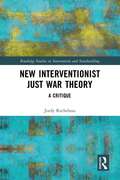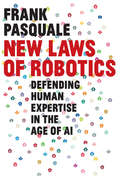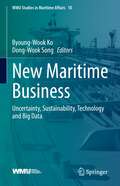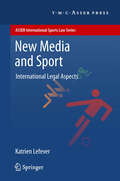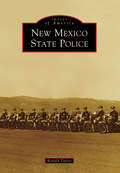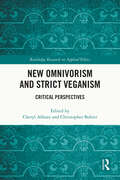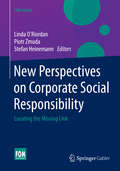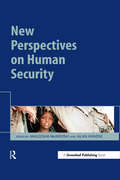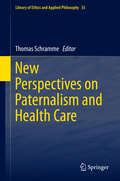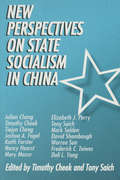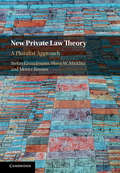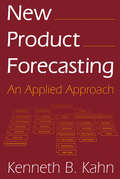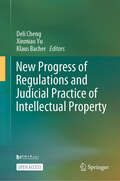- Table View
- List View
New Interventionist Just War Theory: A Critique (Routledge Studies in Intervention and Statebuilding)
by Jordy RocheleauThis book offers a systematic critique of recent interventionist just war theories, which have made the recourse to force easier to justify. The work argues that these theories, including neo-traditionalist prerogatives to national leaders and a cosmopolitan human rights paradigm, offer criteria for war that are insufficient in principle and dangerous in practice. Drawing on a plurality of moral considerations, the book recommends a modified legalist national defense paradigm, which includes an atrocity threshold for humanitarian intervention and a legitimate authorization requirement. The plausibility of this restrictive framework is applied to case studies, including the long wars in Iraq and Afghanistan, ongoing targeted killing, and possible interventions in Syria and elsewhere. Various arguments which seek to loosen the criteria for war are also systematically analyzed and criticized. This book will be of much interest to students of just war theory, military history, ethics, political philosophy, and international relations.
New Jersey's Lindbergh Kidnapping and Trial (Images of America)
by James Davidson Mark W. FalziniThe kidnapping and murder of Charles Lindbergh Jr. and the subsequent arrest, trial, and execution of Bruno Richard Hauptmann have intrigued true crime buffs for decades. New Jersey's Lindbergh Kidnapping and Trial tells the story of "the case that never dies" through vintage photographs. Rare photographs, many not seen since the 1930s, will allow the reader to experience the massive police investigation led by New Jersey State Police superintendent H. Norman Schwarzkopf and the circus-like trial and execution of Bruno Richard Hauptmann.
New Killing Fields: Massacre and the Politics of Intervention
by Nicolaus Mills Kira BrunnerThe question of the responsibility inherent in the unrivaled might of the U.S. military is one that continues to take up headlines across the globe. This award-winning group of reporters and scholars, including, among others, David Rieff, Peter Maass, Philip Gourevitch, William Shawcross, George Packer, Bill Berkeley and Samantha Power revisit four of the worst instances of state-sponsored killing--Cambodia, Yugoslavia, Rwanda, and East Timor--in the last half of the twentieth century in order to reconsider the success and failure of U.S. and U.N. military and humanitarian intervention.Featuring original essays and reporting, The New Killing Fields poses vital questions about the future of peacekeeping in the next century. In addition, theoretical essays by Michael Walzer and Michael Ignatieff frame the issue of intervention in terms of today's post-cold war reality and the future of human rights.
New Law and Ethics in Mental Health Advance Directives: The Convention on the Rights of Persons with Disabilities and the Right to Choose (Explorations in Mental Health)
by Penelope WellerThe recognition of positive rights and the growing impact of human rights principles has recently orchestrated a number of reforms in mental health law, bringing increasing entitlement to an array of health services. In this book, Penelope Weller considers the relationship between human rights and mental health law, and the changing attitudes which have led to the recognition of a right to demand treatment internationally. Weller discusses the ability of those with mental health problems to use advance directives to make a choice about what treatment they receive in the future, should they still be unable to decide for themselves. Focusing on new perspectives offered by the Conventions on the Rights of Persons with Disabilities (CRPD), Weller explores mental health law from a variety of international perspectives including: Canada, Australia, New Zealand and the United Kingdom, where policies differ depending on whether you are in England and Wales, or Scotland. These case studies indicate how human rights perspectives are shifting mental health law from a constricted focus upon treatment refusal, towards a recognition of positive rights. The book covers topics including: refusing treatment new approaches in human rights international perspectives in mental health law the right to demand treatment. The text will appeal to legal and mental health professionals as well as academics studying mental health law, and policy makers.
New Laws of Robotics: Defending Human Expertise In The Age Of Ai
by Frank PasqualeAI is poised to disrupt our work and our lives. We can harness these technologies rather than fall captive to them—but only through wise regulation.Too many CEOs tell a simple story about the future of work: if a machine can do what you do, your job will be automated. They envision everyone from doctors to soldiers rendered superfluous by ever-more-powerful AI. They offer stark alternatives: make robots or be replaced by them.Another story is possible. In virtually every walk of life, robotic systems can make labor more valuable, not less. Frank Pasquale tells the story of nurses, teachers, designers, and others who partner with technologists, rather than meekly serving as data sources for their computerized replacements. This cooperation reveals the kind of technological advance that could bring us all better health care, education, and more, while maintaining meaningful work. These partnerships also show how law and regulation can promote prosperity for all, rather than a zero-sum race of humans against machines.How far should AI be entrusted to assume tasks once performed by humans? What is gained and lost when it does? What is the optimal mix of robotic and human interaction? New Laws of Robotics makes the case that policymakers must not allow corporations or engineers to answer these questions alone. The kind of automation we get—and who it benefits—will depend on myriad small decisions about how to develop AI. Pasquale proposes ways to democratize that decision making, rather than centralize it in unaccountable firms. Sober yet optimistic, New Laws of Robotics offers an inspiring vision of technological progress, in which human capacities and expertise are the irreplaceable center of an inclusive economy.
New Living Cases on Corporate Governance (Management for Professionals)
by Martin HilbThis unique open access book features a selection of Living Cases on Corporate Governance, which were developed and compiled by chairpersons, members of the board of directors, and CEOs in various countries, working in close collaboration with prominent researchers. Each Living Case addresses a current issue that a given company or institution needs to resolve. For every Case, the goal is formulated by the researcher, in consultation with the client. The participants of internal or external board seminars, or university students, then work in teams to analyze the problem, develop an innovative and feasible solution, and summarize the most important lessons learned.
New Maritime Business: Uncertainty, Sustainability, Technology and Big Data (WMU Studies in Maritime Affairs #10)
by Dong-Wook Song Byoung-Wook KoThis book provides a response to the unexpected challenges imposed on every aspect of today’s maritime business. All chapters of this book are concerned with the single challenge facing the maritime business world – that is, uncertainty. Each chapter deals with a specific area of the maritime business community in an effort to better understand the complicated markets, to seek for a solution of economic or financial sustainability under the pressure of climate changes, to discuss technology as an option for the future, and finally to show how to utilise the big data set for better informed decision- and policymaking that used to be unfeasible in terms of scale and capacity. It is hoped that all those endeavours are considered as the first small step towards practically transforming the industry in line with Schumpeter (1943) as well as academically changing a paradigm of thinking and scientific discovery in line with Kuhn (2012), so that the maritime industry is better informed and prepared, and can greatly contributing to human lives.
New Media and Sport
by Katrien LefeverDuring the past decade, the media landscape and the coverage of sports events have changed fundamentally. Sports fans can consume the sports content of their choice, on the platform they prefer and at the time they want. Furthermore, thanks to electronic devices and Internet, content can now be created and distributed by every sports fan. As a result, it is argued that media regulation which traditionally contains rules safeguarding access to information and diversity would become redundant. Moreover, it is sometimes proposed to leave the regulation of the broadcasting market solely to competition law.This book, illustrates that media law is still needed, even in an era of abundance, to guarantee public's access to live and full sports coverage. Dealing with the impact of new media on both media and competition law this book will greatly appeal to academics and stakeholders from various disciplines, such as legal and public policy, political science, media and communications studies, journalism and European studies. Additionally it contains valuable information and points of view for policy makers, lawyers and international and intergovernmental organisations, active in media development. The book contains an up-to-date analysis and overview of the different competition authorities' decisions and media provisions dealing with the sale, acquisition and exploitation of sports broadcasting rights. Katrien Lefever is Senior Legal Researcher at IBBT - The Interdisciplinary Centre for Law and ICT (ICRI), KU Leuven, Belgium. The book appears in the ASSER International Sports Law Series, under the editorship of Prof. Dr. Robert Siekmann, Dr. Janwillem Soek and Marco van der Harst LL.M.
New Methuselahs: The Ethics of Life Extension (Basic Bioethics)
by John K. DavisAn examination of the ethical issues raised by the possibility of human life extension, including its desirability, unequal access, and the threat of overpopulation. Life extension—slowing or halting human aging—is now being taken seriously by many scientists. Although no techniques to slow human aging yet exist, researchers have successfully slowed aging in yeast, mice, and fruit flies, and have determined that humans share aging-related genes with these species. In New Methuselahs, John Davis offers a philosophical discussion of the ethical issues raised by the possibility of human life extension. Why consider these issues now, before human life extension is a reality? Davis points out that, even today, we are making policy and funding decisions about human life extension research that have ethical implications. With New Methuselahs, he provides a comprehensive guide to these issues, offering policy recommendations and a qualified defense of life extension. After an overview of the ethics and science of life extension, Davis considers such issues as the desirability of extended life; whether refusing extended life is a form of suicide; the Malthusian threat of overpopulation; equal access to life extension; and life extension and the right against harm. In the end, Davis sides neither with those who argue that there are no moral objections to life enhancement nor with those who argue that the moral objections are so strong that we should never develop it. Davis argues that life extension is, on balance, a good thing and that we should fund life extension research aggressively, and he proposes a feasible and just policy for preventing an overpopulation crisis.
New Mexico State Police (Images of America)
by Ronald TaylorThe New Mexico State Police traces its beginnings to the New Mexico Mounted Police, a statewide law-enforcement agency that was disbanded in 1921. No state law enforcement existed until the formation of the New Mexico Motor Patrol in 1933. A year and a half later, the governor of the state of New Mexico and the chief of the patrol saw the need to expand their forces to better serve the citizens of New Mexico. The New Mexico State Police formed in 1935, marking the beginning of what has become many years of tradition and service.
New Mexico's Rangers: The Mounted Police (Images of America)
by Chuck HornungThe New Mexico Mounted Police were forged from a frontier civil crisis and hammered to life upon the anvil of necessity. The Sunshine Territory of New Mexico had become the last outlaw haven in the Southwest. In the tradition of their red-coated namesake, the Northwest Mounted Police of Canada, this small band of range riders used their fists, guns, and brains to restore law and order during the closing years of New Mexico's territorial era. They carried their mission forward into the early days of statehood.
New Omnivorism and Strict Veganism: Critical Perspectives (Routledge Research in Applied Ethics)
by Cheryl Abbate Christopher BobierA growing number of animal ethicists defend new omnivorism—the view that it’s permissible, if not obligatory, to consume certain kinds of animal flesh and products. This book puts defenders of new omnivorism and advocates of strict veganism into conversation with one another to further debate in food ethics in novel and meaningful ways. The book includes six chapters that defend distinct versions of new omnivorism and six critical responses from scholars who are sympathetic to strict veganism. The contributors debate whether it’s ethically permissible to eat the following: "freegan" meat; roadkill; cultured meat; genetically disenhanced animals; possibly insentient animals, such as insects; and fish. The volume concludes with two chapters that examine strict vegan and new omnivore policies. Presenting readers with clear defenses and criticisms of the various dietary proposals, this book draws attention to the most important ethical challenges facing traditional animal agriculture and alternative systems of food production. New Omnivorism and Strict Veganism will appeal to scholars and students interested in food ethics, animal ethics, and agricultural ethics.
New Pathways to Civil Justice in Europe: Challenges of Access to Justice
by Xandra Kramer Alexandre Biard Jos Hoevenaars Erlis ThemeliThis book focuses on four topical and interconnected, innovative pathways to civil justice within the context of securing and improving access to justice: the use of Artificial Intelligence and its interactions with judicial systems; ADR and ODR tracks in privatising justice systems; the effects of increased self-representation on access to justice; and court specialization and the establishment of commercial courts to counter the trend of vanishing court trials. Top academics and experts from Europe, the US and Canada address these topics in a critical and multidisciplinary manner, combining legal, socio-legal and empirical insights. The book is part of ‘Building EU Civil Justice’, a five-year research project funded by the European Research Council. It will be of interest to scholars and policymakers, as well as practitioners working in the areas of civil justice, alternative dispute resolution, court systems, and legal tech. The chapters “Introduction: The Future of Access to Justice – Beyond Science Fiction” and “Constituting a Civil Legal System Called “Just”: Law, Money, Power, and Publicity” are available open access under a Creative Commons Attribution 4.0 International License via link.springer.com.
New Perspectives on Corporate Social Responsibility
by Linda O'Riordan Piotr Zmuda Stefan HeinemannProviding a timely contribution to the ongoing questions surrounding topics which are by definition subject to varying stakeholder interpretations, this book addresses "the missing link" between theoretical CSR concepts and everyday management practice. It acts as a guide to awaken managers to the advantages of adopting a CSR "mindset" when developing sustainable business strategies. The book consists of three parts: 1) A theoretical realm which establishes the key concepts and rationale for the adoption of a sustainable CSR approach, 2) A practical realm which addresses putting CSR and sustainability into business practice, 3) An educational realm which proposes how to incorporate the concepts into teaching and training.
New Perspectives on European Women's Legal History (Routledge Research in Gender and History #24)
by Sara L. Kimble Marion RöwekampThis book integrates women’s history and legal studies within the broader context of modern European history in the late nineteenth and twentieth centuries. Sixteen contributions from fourteen countries explore the ways in which the law contributes to the social construction of gender. They analyze questions of family law and international law and highlight the politics of gender in the legal professions in a variety of historical, social and national settings, including Eastern, Southern, Western, Northern and Central Europe. Focusing on different legal cultures, they show us the similarities and differences in the ways the law has shaped the contours of women and men’s lives in powerful ways. They also show how women have used legal knowledge to struggle for their equal rights on the national and transnational level. The chapters address the interconnectedness of the history of feminism, legislative reforms, and women’s citizenship, and build a foundation for a comparative vision of women’s legal history in modern Europe.
New Perspectives on Human Security
by Alan Hunter Malcolm McIntoshThis book is testimony to the emergent nature of human security as an idea, as a useful construct and as an operational strategy. The aim is to showcase new directions that may enrich the human security agenda. Some human security discourse is still rooted in the traditional language of the aid-agency/UN development/economic growth models, often hostile to the corporate and business sector, and sometimes negligent of sustainability and climate change issues. Another limited and outmoded approach is an exaggerated focus on Western interventions, especially military ones, as a "solution" to problems in poor or conflict-prone areas. "Human Security" was introduced as a construct by the UNDP in 1994. The inherent combination of law-enforcement and people-centred humanitarianism has strived to provide an umbrella to both protect people from threats while empowering them to control their destinies. But with accelerating economic globalization and information flows there is a need to revisit the concept. A new paradigm of Sustainable Human Security is required. This book argues that proponents of a human security approach should welcome efforts to remove the barriers between enterprise, corporations, aid and development agencies, government agencies, citizen groups and the UN; and work towards multi-stakeholder approaches and solutions for vulnerable populations. Such an approach is clearly vital in responding to the imperatives of concerted action on issues such as climate change, HIV, terrorism, organised crime and poverty. The agenda may have changed, but it remains true that almost all human tragedies are avoidable. This book examines a number of global problems through the lens of human security and the needs of the individual: global governance; health; the environment and the exploitation of natural resources; peace and reconciliation; the responsibility to protect; and economic development and prosperity. In the latter case, the role of business in the human security pantheon is promulgated. There are many reasons why businesses may want to engage with the needs of vulnerable populations – not least the fact that companies cannot function without secure trading environments. In addition, there are growing demands for corporate responsibility and citizenship from markets, customers, shareholders, employees and, critically, communities. This book throws new light on the human security agenda. It will be essential reading for anyone involved in the debates on human security as well as for practitioners and scholars in international affairs, global governance, peace studies, climate change and the environment, healthcare, responsibility to protect and corporate responsibility.
New Perspectives on Paternalism and Health Care
by Thomas SchrammeThis work sets the stage regarding debates about paternalism and health care for years to come. The anthology is organized around four parts: i) The concept of paternalism and theoretical issues regarding the idea of anti-paternalism, ii) strategies for justifying different forms of paternalism, iii) paternalism in psychiatry and psychotherapy, iv) paternalism and public health, and v) paternalism and reproductive medicine. Medical paternalism was arguably one of the main drivers of debates in medical ethics and has led to a wide acknowledgement of the value of patient autonomy. However, more recent developments in health care, such as the increasing significance of public health measures and the commercialization of medical services, have led to new social circumstances and hence to the need to rethink issues regarding paternalism. This work provides an invaluable source for many scholars and practitioners, since it deals in new and original ways with one of the main and oldest issue in health care ethics.
New Perspectives on Property Law: Human Rights and the Family Home
by Alastair HudsonThe essays in this collection consider the fundamental concepts of property and obligations in law. Ideas of property and of obligations are central, organising concepts within law but are nevertheless liable to fragmentation and esoteric development when applied in particular contexts.
New Perspectives on Property Law: Obligations and Restitution
by Alastair HudsonFirst published in 2003. Routledge is an imprint of Taylor & Francis, an informa company.
New Perspectives on State Socialism in China
by Timothy Cheek Tony SaichPlacing Chinese Community Party history in the realm of social history and comparative politics, this text studies the roots of the policy failures of the late Maoist period and the tenacity of the CCP.
New Philosophical Essays on Love and Loving
by Simon CushingNew philosophical essays on love by a diverse group of international scholars. Topics include contributions to the ongoing debate on whether love is arational or if there are reasons for love, and if so what kind; the kinds of love there may be (between humans and artificial intelligences, between non-human animals and humans); whether love can explain the difference between nationalism and patriotism; whether love is an necessary component of truly seeing others and the world; whether love, like free will, is “fragile,” and may not survive in a deterministic world; and whether or not love is actually a good thing or may instead be a force opposed to morality. Key philosophers discussed include Immanuel Kant, Iris Murdoch, Bernard Williams, Harry Frankfurt, J. David Velleman, Niko Kolodny, Thomas Hurka, Bennett Helm, Alfred Mele and Derk Pereboom. Essays also touch on the treatment of love in literature and popular culture, from Graham Greene’s The End of the Affair to Spike Jonze’s movie her.
New Private Law Theory: A Pluralist Approach
by Stefan Grundmann Hans Micklitz Moritz RennerNew Private Law Theory opens a new pathway to private law theory through a pluralistic approach. Such a theory needs a broad and stable foundation, which the authors have built here through a canon of nearly seventy texts of reference. This book brings these different texts from different disciplines into conversation with each other, grouping them around central questions of private law and at the same time integrating them with the legal doctrinal analysis of example cases. This book will be accessible to both experienced and early career scholars working on private law.
New Product Forecasting: An Applied Approach
by Kenneth B. KahnConcise and jargon free, this is a one-step primer on the tools and techniques of forecasting new product development. Equally useful for students and professionals, the book is generously illustrated, and features numerous current real-world industry cases and examples. Part I covers the basic foundations and processes of new product forecasting, and links forecasting to the broader processes of new product development and sales and operations planning. Part II includes detailed, step-by-step techniques of new product forecasting, from judgmental techniques to regression analysis. Each chapter in this section begins with the most basic techniques, then progresses to more advanced levels. Part III addresses managerial considerations of new product forecasting, including postlaunch issues such as cannibalization and supercession. The final chapter presents an important set of industry best practices and benchmarks.
New Progress of Regulations and Judicial Practice of Intellectual Property
by Deli Cheng Xinmiao Yu Klaus BacherThis open access book brings together two types of cases at home and abroad. One is the latest influential cases in the field of intellectual property rights in the past three years, and the other is the classic intellectual property cases in the world. The types of cases involve typical cases in the fields of patents, trademarks, copyrights, unfair competition, etc., involving a wide range of intellectual property laws and a complete range of categories. Some cases have been a sensation, and some legal issues have been raised or clarified for the first time in relevant judgments. Many cases not only have a wide range of social influence but also have typical legal application significance. Many cases involve facts and legal issues that go beyond the case and the adjudication itself and have greater reference significance. At the same time, we also attached the different opinions of some case judgments, such as the Concurring Opinion and the Dissenting Opinion in the US judgment, reflecting the different understandings of different judges on the application of the law. This part is also very meaningful.
New Public Management in Africa: Contemporary Issues (Palgrave Studies of Public Sector Management in Africa)
by Justice Nyigmah Bawole Ogechi Adeola Robert E. Hinson Isaiah Adisa Nnamdi Madichie Kwame AsamoahThis book analyses and evaluates the accomplishments, challenges, and approaches associated with the New Public Management (NPM) in Africa towards establishing context-specific interventions for public sector institutions' performance. Taking the reader through various business and management approaches, including leadership in the public sector, digitalisation, market orientation and trust building, this book provides an understanding of the key issues facing public sector organisations in Africa and offers novel ways of approaching public management in a changing socio-economic landscape to drive improved performance of public institutions.The book offers students, practitioners and researchers important insights on NPM and public sector institutions in Africa. The recommendations of the book will help government and policymakers implement appropriate public sector management policies for strengthening public sector service delivery in Africa.
